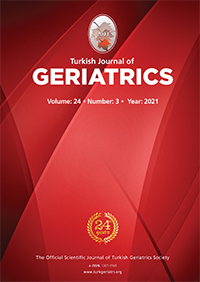2Inonu University, School of Medicine, Department of Biochemistry, Malatya, Turkey
3Malatya Training and Research Hospital, Department of Biochemistry, Malatya, Turkey
4Inonu University, School of Medicine, Department of Neurology, Malatya, Turkey DOI : 10.31086/tjgeri.2021.238 Introduction: Parkinson"s disease dementia is an important condition that worsens the quality of life in approximately 30% of parkinson disease patients. Vitamin D deficiency and brain-derived neurotrophic factor have been implicated in the pathogenesis of alzheimer type dementia, parkinson"s disease, and many neurodegenerative diseases. The aim of this study was to investigate the relationship between cognitive impairment and 25-hydroxy vitamin D and brain-derived neurotrophic factor levels in parkinson"s disease dementia patients.
Materials and Method: 25-hydroxy vitamin D and brain-derived neurotrophic factor serum levels were evaluated in patients with parkinson"s disease dementia (n = 63) and healthy controls (n = 33). Brain-derived neurotrophic factor and vitamin D levels were examined using one sample t-tests, and multiple comparisons among independent groups were done using ANOVA post hoc Tukey"s test analysis. Wechsler Memory Scale and Mini- Mental State Examination were used to evaluate the cognitive functions of the groups. The disease levels of the patients were determined using the Hoehn and Yahr scale and the Unified Parkinson"s Disease Rating Scale.
Results: There was a significant negative correlation between the worsening of dementia and vitamin D levels (p = 0.009). However, there were significant negative correlations between the unified parkinson"s disease rating scale daily living activity and Hoehn and Yahr scales and vitamin D levels. No significant relationship was found between brain-derived neurotrophic factor and parkinson"s disease dementia (p = 0.983).
Conclusions: Vitamin D deficiency plays a role in cognitive loss in parkinson"s disease dementia. Vitamin D replacement can be used in dementia support treatment.
Keywords : Parkinson Disease; Dementia; Vitamin D; Brain-Derived Neurotrophic Factor
